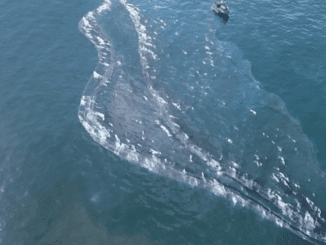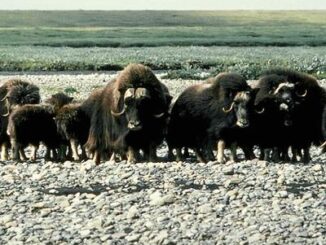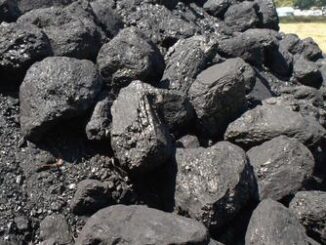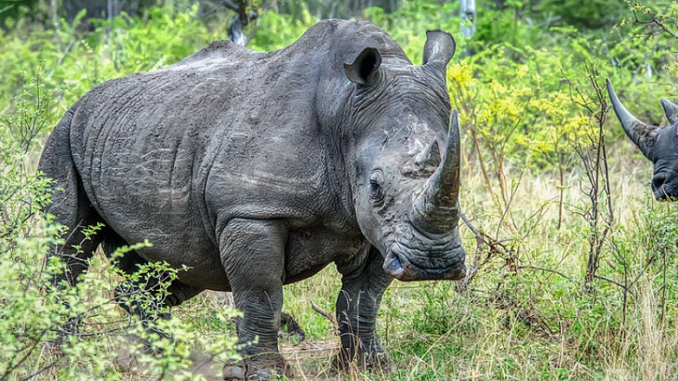
By Don Pinnock
KRUGER NATIONAL PARK, South Africa, March 28 (ENS) – Yet another suspected poacher has died in a hail of bullets fired by unknown gunmen in the eastern province of Mpumalanga’s landscape of fear. Clyde Mnisi, Chief of the Mnisi Tribal Authority, trailing charges of murder, money laundering, illegal sale of rhino horn and racketeering, died of multiple bullet wounds near Kruger Mpumalanga International Airport late Sunday night.
Police and prosecutors allege Mnisi is one of the “kingpins” in a massive poached rhino horn trafficking network. He was scheduled to appear in the Mpumalanga High Court in April to face charges relating to rhino poaching and money laundering.

At least 40 percent of Kruger Park’s law enforcement employees are corrupt and up to 70 percent of other park employees may be assisting poachers who have decimated the rhino population, according to journalist Julian Rademeyer, citing senior Kruger Park officials in a report for the European Union-funded crime response organisation Enact.
In just one section in the south of the park, Rademeyer found, 14 of its 20 rangers had been linked to poaching networks.
Widespread corruption at Kruger National Park linked to criminal syndicates in Mpumalanga and the murder of honest rangers are its greatest threats.
“Investigations by private auditing firm KPMG and the Hawks focusing on the IPZ (Intense Protection Zone), home to most of Kruger’s rhinos, have uncovered evidence of payments from syndicates to at least 50 staff from all walks of life. And these numbers are likely to increase,” he reports.
According to the park’s Head Ranger Cathy Dreyer, referring to poaching, “It is impossible for someone to come into Kruger now without some sort of inside link or inside information.”
Report Highlights Landscapes of Fear
The report, “Landscapes of Fear: crime, corruption and murder in greater Kruger,” found the internal corruption, breakdown of trust and staff cohesion, plus worsening organised crime in Mpumalanga to be greater threats to the future of the park than poaching.
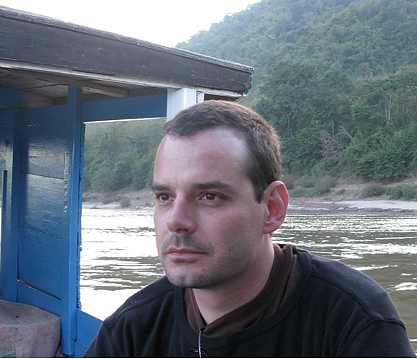
The report is the outcome of interviews with senior wildlife law enforcement officials, security consultants, SANParks officials, conservation managers and provincial specialists on organised crime and corruption.
The corrosion was kick-started by rhino poaching. Between 2011 and 2020 Kruger’s white rhino population fell by 75 percent, from around 10,600 to 2,607. But it has metastasized, says the report, into “toxic politics, deep-seated inequality, corruption and embedded organised criminality” which have profoundly affected the park and surrounding communities.
This has not taken place in isolation. Crime and corruption in the park, says Rademeyer, have been impacted by “organised crime in Mpumalanga, including kidnappings, cash-in-transit heists, ATM bombings, illegal mining, extortion and corruption.”
According to the report, “relations between staff and management have become strained and increasingly toxic, poisoned by mutual mistrust and suspicion. Morale is low. Accusations of racism and unfair treatment – some real and some in a cynical effort to stymie disciplinary proceedings and investigations – have fuelled tensions.”
To be effective, short-term, reactive policing tactics must be replaced with a long-term strategy to counter and disrupt key criminal networks, Rademeyer recommends.
A key issue has been integrity/polygraph testing. According to the report, integrity testing works well, but faced problems in Kruger, not the least being union opposition. It is also expensive and, to be effective, the entire staff needs to be tested. During Covid, the operational budget of South Africa Nation Parks, SANParks, was cut by 70 percent and it claims to not have the funds to do this.
However, SANParks financial results for the six months up to September 30 show a rand surplus of R172-million compared to a deficit of R188-million the previous year. After extensive negotiations with unions, in November 2022, the board approved integrity testing, with envisaged implementation by the fourth quarter of the 2023 financial year.
Park Employees at Risk
Kruger employs around 2,500 staff and supports an additional 4,500 jobs in surrounding communities. About 400 staff are field rangers, most of whom are from Mpumalanga and Limpopo, South Africa’s northernmost province, with their families living in villages and small towns surrounding the park. They are at enormous risk from coercion and threats.
“You work in the park, your wife is alone at home with the kids and this is where the kids go to school. You make the choice,” Rademeyer was told. “The ranger begins to provide information to the syndicate. He receives his first payment of R25,000 in cash or into a bank. Nothing happens to him. And then he helps, again and again, pocketing the money and protecting his family.”
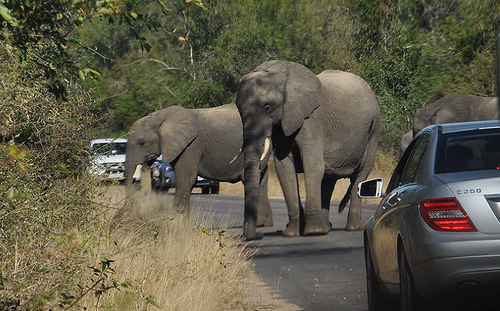
Then one day the poacher asks for a favour. He can’t refuse.
According to Head Ranger Dreyer, “There are 52 vacancies in ranger services alone and no money to fill them. But even if we had the money tomorrow, we are certainly not going to recruit 52 people and put them into what is not a nice work environment at the moment.”
“If you bring anyone in now, you’re just going to break him or her. How do you create a safe space in this world of no loyalty, no trust anymore?”
“Landscapes of Fear” found that the internal corruption, breakdown of trust and staff cohesion plus worsening organised crime in Mpumalanga to be of greater threat to the future of the park than poaching.
According to Rademeyer, Kruger’s field rangers, particularly the first responders dropped by helicopter into armed “contacts” with poaching gangs, face enormous psychological and physical pressures that inevitably sap morale. This has led many of them to question the militarised tactics being used and whether they are fair or moral.
The militarised response to poaching has come at a terrible human cost in the lives of rangers, police, soldiers and poachers. Between 2010 and 2015, the worst years of poaching, up to 200 suspected poachers were shot and killed in Kruger and seven South African National Defence Force soldiers lost their lives. Many were grievously wounded.
It is unclear how the rest of the rangers feel at being exposed to the additional work pressure and risks resulting from the unfilled positions, equating to 11 percent of field ranger positions.
Dreyer’s statement contradicts a commitment by a senior SANParks employee to the Parliamentary Committee on Environment that the 87 ranger posts vacant in mid-2022 would be filled by the end of 2023.
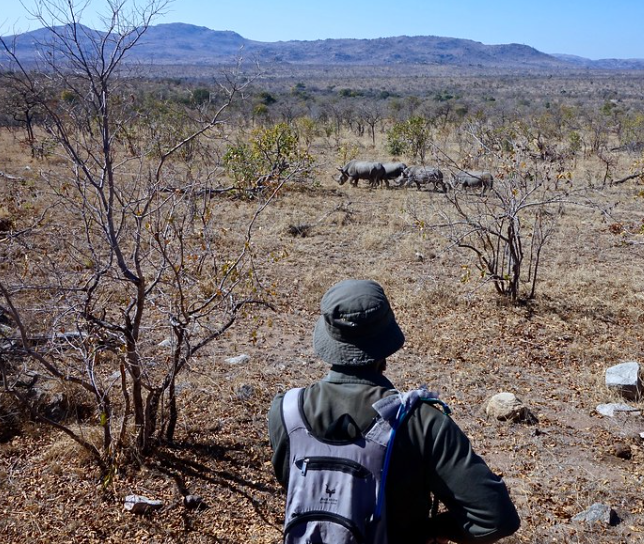
September 1, 2016 (Photo by Anouk Pilon)
In response to a parliamentary question, Environment Minister Barbara Creecy said that 15 of the 88 (sic) vacant positions had been advertised, five had been filled.
However “the filling of vacant unbudgeted for positions at SANParks is also dependent on the availability of funds. As and when funds become available, priority positions are advertised.”
It is not clear how positions can actually exist but be unbudgeted for or why ranger positions are not considered a priority and budgeted for. Some have been vacant for as long as five years. The SANParks results for the first half of the 2023 financial year show an underspend on human resource costs of some R9-million which could clearly have paid for the vacant ranger positions.
Kruger a Strategic Pawn in Service Delivery Protests
More than 2.9 million people live within 50 kilometres (30 miles) of Kruger’s western boundary fence and most are poor. At the end of 2022 average unemployment in the area was 46.5 percent.
Amid rising discontent over poverty and inequality, Kruger’s significance as a tourist destination, says the Enact report, has made it a strategic pawn in protests against poor service delivery and inadequate housing, electricity, water and roads.
Some of this is fueled by internecine feuds between rival factions of the African National Congress, ANC
Around the park, illicit markets abound and violence and murder are common. Honest officials fear for their lives.
Violent organised crime was behind the assassinations of Directorate for Priority Crime Investigation (the Hawks) investigator Lieutenant-Colonel Leroy Bruwer in 2020 and Timbavati head ranger Anton Mzimba in 2022.
Poachers Become Heroes
In 2021 Petros Mabuza “Mister Big,” a notorious cash-in-transit and rhino-poaching syndicate boss, was killed in a hit as he parked in a mall in Hazyview, Mpumalanga. At his funeral his casket arrived by helicopter draped in a leopard skin and crowds sang his praises.
Local police stations, says the report, are riddled with corruption.
“They are deeply in the pockets of organised-crime groups involved in poaching, cash-in-transit heists, car and truck hijackings, armed robberies, ATM bombings and illegal gold mining. Thus, they offer little meaningful protection. Sometimes they even serve as escorts for contraband,” Rademeyer writes.
“The more honest police and those who feel a sense of dedication to their communities have little option but to turn a blind eye to the activities of their colleagues for fear of being killed,” he states.
Crime Province Mpumalanga
Mpumalanga is considered one of South Africa’s most corrosively corrupt provinces. Over the past decade, its murder rate has increased by 42 percent, and between April and June 2022, there were 234 kidnappings – including those involving ransom or extortion.
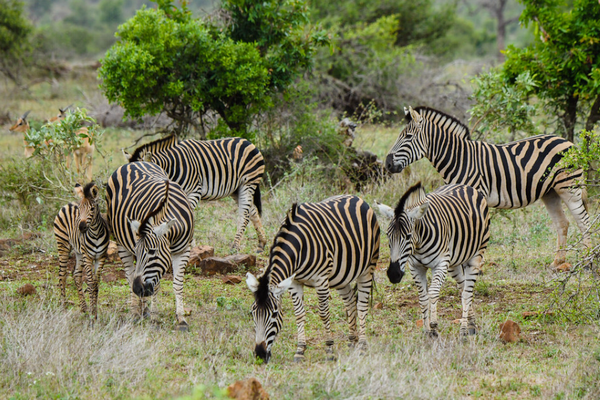
The “Landscape of Fear” report quotes veteran Mpumalanga journalist Sizwe sama Yende who describes it as “a province crippled by a succession of corrupt actors and administrations.” It is “blinded by the glitter of public resources it holds in its hands and unable to resist the urge to become rapacious as if government was closing shop in one hour.”
“It is quite common to find an official who was fired or demoted for corruption a few years back now occupying a position at the apex of a department without any rehabilitation or punitive process having taken place,” he writes.
The geopolitical context within which Kruger operates has been exposed in a series of investigations by Our Burning Planet journalist Kevin Bloom. In an article entitled, “What happens when an ecosystem collapse and State Capture collide?” he outlined how land rights scams and illegal hunting have been linked to the highest rungs of local politics.
This has come to light in the legal clash between the conservationist Fred Daniel and then Deputy President David Mabuza over Daniel’s attempts to establish a conservation sanctuary. Since July 2010, Daniel has been seeking justice in the Pretoria High Court for the loss of his 39,000-hectare nature reserve, a loss which, he argues, was brought about by his conflict with the Mpumalanga politicians.
‘Slush Fund’ for Hunting Rights
Court proceedings disclosed a hunting scam involving private individuals, in collusion with the Mpumalanga Tourism and Parks Agency, cashing in on selling shoot licences for the hunting of so-called “problem animals” that escape from Kruger Park.
Investigator Paul O’Sullivan found the Problem Animal Fund had become “nothing more nor less than a slush fund” for buying and selling hunting rights.
A year earlier, Bloom had uncovered the sudden transfer of land rights from the Mthimkhulu community on the Letaba River bordering Kruger, which had dropped its fences with the park, to a chief 50 kilometres (30 miles) away and not recognised by the local people.
The Mthimkhulu community, which had been deriving a steady income from legal hunting, found these revenues now went elsewhere. As a result, they took to bushmeat poaching, with devastating results.
Some Successes
Kruger Park has notched up some successes. Rademeyer notes renewed efforts to combat corruption, coupled with “a refreshing openness about the extent of the problem and a desire to address it.”
Successes include the arrest of two rangers and 11 alleged accomplices implicated in poaching networks, corruption and money laundering.
Long-running financial investigations have identified payments to dozens of Kruger staff and helped pinpoint key actors, giving further cause for hope.
In April 2022, the Mpumalanga Hawks’ serious corruption investigation team arrested two veteran Kruger field rangers based in the park’s Stolsnek ranger section. In their fifties and sixties, Daniel Chikwa Maluleke and Solly Ubisi had spent most of their working lives in Kruger.
They were charged with corruption, money laundering and fraud linked to poaching and wildlife trafficking, the first case of its kind in the park. A Hawks spokesman said they had allegedly “provided tactical information to rhino-poaching syndicates in exchange for large sums of money.”
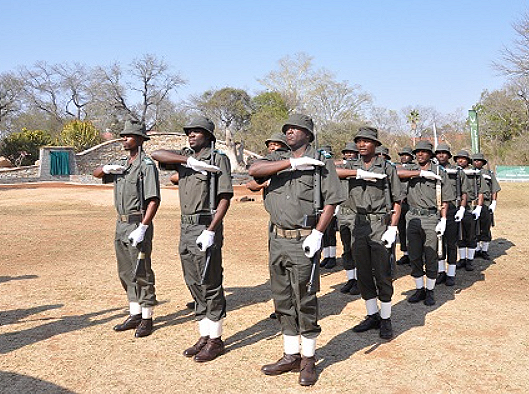
According to Rademeyer, Kruger’s challenge is immense. “Turning it around will require addressing corruption in the park and mending deeply fractured relations between staff and management. Any efforts to counter corruption within Kruger needs to be coupled with carefully targeted efforts to address broader criminal ecosystems in Mpumalanga.”
“To be effective, short-term, reactive policing tactics must be replaced with a long-term strategy to counter and disrupt key criminal networks,” he writes.
Prosecutions of high-level actors should be a priority, and possible amnesties could be offered to low-level offenders who cooperate with investigators. An independent whistle-blowing mechanism should be set up with all necessary protections and rewards, through which corruption can be reported, evaluated and investigated, Rademeyer recommends.
Kruger National Park acknowledged the report and welcomed its “overall sentiment.”
Kruger Park Communications Officer Isaac Phaahla told “The Mail & Guardian,” in February, when “Landscape of Fear was published, “It does not surprise us at all as it is something the organisation has always alluded to – that wildlife crime is orchestrated by sophisticated criminal syndicates and should be addressed by law enforcement agencies and those with relevant competencies.”
The Kruger Park Management Plan 2018-2028 says the park’s ideal is to “conserve, protect and manage biodiversity, wilderness qualities and cultural resources, provide a diverse and responsible visitor experience, contributing towards social, ecological and economic resilience and well-being whilst strengthening constituency within a unique regional landscape. Its objective is to restore and maintain the benefits of species of special concern by managing threats as far as possible.”
The Enact report shows how far the park needs to travel to get there.
Commissioned by the Conservation Action Trust, this article was originally published in “The Daily Maverick” newspaper. Republished with permission.
© 2023, Environment News Service. All rights reserved. Content may be quoted only with proper attribution and a direct link to the original article. Full reproduction is prohibited.

